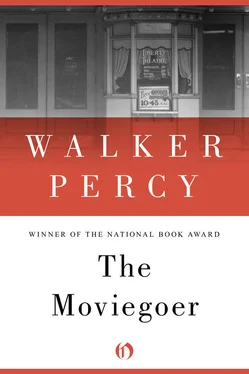“I must get those plans.”
“Come on now Jack don’t.” Lonnie shrinks back fearfully-joyfully. His hand curls like a burning leaf.
My mother sticks her head out of the kitchen.
“Now aren’t those two a case?” She turns back to Sharon. “I tell you, that Lonnie and Jack are one more case.”
After I kiss him good-by, Lonnie calls me back. But he doesn’t really have anything to say.
“Wait.”
“What?”
He searches the swamp, smiling.
“Do you think that Eucharist—”
“Yes?”
He forgets and is obliged to say straight out: “I am still offering my communion for you.”
“I know you are.”
“Wait.”
“What?”
“Do you love me?”
“Yes.”
“How much?”
“Quite a bit.”
“I love you too.” But already he has the transistor in the crook of his wrist and is working at it furiously.
7
ON ITS WAY HOME the MG becomes infested with malaise. It is not unexpected, since Sunday afternoon is always the worst time for malaise. Thousands of cars are strung out along the Gulf Coast, whole families, and all with the same vacant headachy look. There is an exhaust fume in the air and the sun strikes the water with a malignant glint. A fine Sunday afternoon, though. A beautiful boulevard, ten thousand handsome cars, fifty thousand handsome, well-fed and kind-hearted people, and the malaise settles on us like a fall-out.
Sorrowing, hoping against hope, I put my hand on the thickest and innerest part of Sharon’s thigh.
She bats me away with a new vigor.
“Son, don’t you mess with me.”
“Very well, I won’t,” I say gloomily, as willing not to mess with her as mess with her, to tell the truth.
“That’s all right. You come here.”
“I’m here.”
She gives me a kiss. “I got your number, son. But that’s all right. You’re a good old boy. You really tickle me.” She’s been talking to my mother. “Now you tend to your business and get me on home.”
“Why?”
“I have to meet someone.”
1
SAM YERGER IS WAITING for me on the sidewalk, bigger than life. Really his legs are as big and round as an elephant’s in their heavy cylindrical linens and great flaring brogues. Seeing him strikes a pang to the marrow; he has the urgent gentle manner of an emissary of bad news. Someone has died.
Beyond a doubt he is waiting for me. At the sight of my MG, he makes an occult sign and comes quickly to the curb.
“Meet me in the basement,” he actually whispers and turns and goes immediately up the wooden steps, his footsteps echoing like pistol shots.
Sam looks very good. Though he is rumpled and red-eyed, he is, as always, of a piece, from his bearish-big head and shoulders and his soft collar riding up like a ruff into the spade of hair at the back of his neck to his elephant legs and black brogues. It would be a pleasure to be red-eyed and rumpled if one could do it with Sam’s style. His hair makes two waves over his forehead in the Nelson Eddy style of a generation ago.
Sam Yerger’s mother, Aunt Mady, was married to Judge Anse’s law partner, old man Ben Yerger. After college in the East, Sam left Feliciana Parish for good and worked on the old New Orleans Item. In the nineteen thirties he wrote a humorous book about the French-speaking Negroes called Yambilaya Ya-Ya which was made into a stage show and later a movie. During the war Sam was chief of the Paris bureau of a wire service. I remember hearing a CBS news analyst call him “an able and well-informed reporter.” For a while he was married to Joel Craig, a New Orleans beauty (Joel’s voice, a throaty society voice richened, it always seemed to me, cured, by good whisky — took on for me the same larger-than-life plenitude as Sam himself). They lived first in the Quarter and then in the Mexican state of Chiapas, where I visited them in 1954. There he wrote a novel called The Honored and the Dishonored which dealt, according to the dust jacket, with “the problem of evil and the essential loneliness of man.” Sam broke his leg in search of some ruins in a remote district and nearly died before some Indians found the two of them. He and Joel were very fond of each other and liked to joke in a way that at first seemed easy-going. For example, Sam liked to say that Joel was just the least little bit pregnant, and before they were married Joel liked to say that she was sick and tired of being Sam’s bawd; I liked hearing her say bawd in that big caramel voice. She liked to call me Leftenant: “Leftenant, it has at long last dawned on me what it is about you that attracts me.” “What?” I asked, shifting around uneasily. “You’ve got dignidad, Leftenant.” It was not a good thing to say because thereafter I could never say or do anything without a consciousness of my dignity. When I visited them in Mexico, each spoke highly of the other and in the other’s presence, which was slightly embarrassing. “He’s quite a guy,” Joel told me. “Do you know what he told me after lying under a cliff for thirty six hours with two inches of his femur sticking out? He said: Queenie, I think I’m going to pass out and before I do, I’m going to give you a piece of advice — God, I thought he was going to die and knew and was telling me what to do with his book — and he said quite solemnly: Queenie, always stick to Bach and the early Italians — and passed out cold as a mackerel. And by God, it’s not bad advice.” Sam would say of Joel: “She’s a fine girl. Always cherish your woman, Binx.” I told him I would. That summer I had much to thank him for. At the City College of Mexico I had met this girl from U.C.L.A. named Pat Pabst and she had come down with me to Chiapas. “Always cherish your woman,” Sam told me and stomped around in very good style with his cane. I looked over at Pat Pabst who, I knew, was in Mexico looking for the Real Right Thing. And here it was: old Sam, a regular bear of a writer with his black Beethoven face, pushing himself around with a stoic sort of gracefulness; and I in my rucksack and with just the hint of an old Virginian voice. It was all her little California heart desired. She clave to me for dear life. After leaving Mexico — he had been overtaken by nostalgia, the characteristic mood of repetition — Sam returned to Feliciana where he wrote a nostalgic book called Happy Land which was commended in the reviews as a nice blend of a moderate attitude toward the race question and a conservative affection for the values of the agrarian South. An earlier book, called Curse upon the Land, which the dust jacket described as “an impassioned plea for tolerance and understanding,” had not been well received in Feliciana. Now and then Sam turns up in New Orleans on a lecture tour and visits my aunt and horses around with Kate and me. We enjoy seeing him. He calls me Brother Andy and Kate Miss Ruby.
“We’ve got to get Kate out of here and to do it, I need your help.”
Sam comes bursting through Kate’s new shutters and starts pacing up and down the tiny courtyard where I sit hunched over and bemused by the malaise. I notice that Kate has begun peeling plaster from the wall of the basement, exposing more plantation brick. “Here’s the story. She’s going to New York and you’re going to take her there. Take her there today and wait for me — I’ll be back in ten days. She is to see Etienne Suë—you know who he is: one of those fabulous continental geniuses who is as well known for his work in Knossan antiquities as his clinical researches. The man is chronically ill himself and sees no more than a handful of patients, but he’ll see Kate. I’ve already called him. But here is the master stroke. I’ve already made arrangements for her to stay with the Princess.”
Читать дальше












